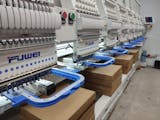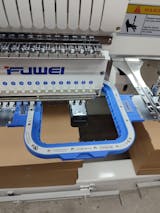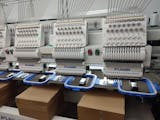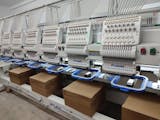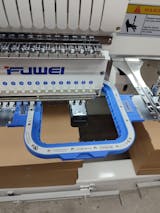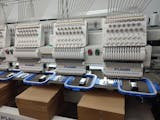1. Introduction to Used Toyota Embroidery Machines
Toyota's legacy in the commercial embroidery industry is as robust as the machines it produces. Known for their durability and precision, Toyota embroidery machines have been a staple in many embroidery businesses. The current market trends show a growing interest in pre-owned Toyota machines, largely due to their reliability and cost-effectiveness. Buyers are increasingly looking at used Toyota embroidery machines for sale, such as the AD830 and ESP 9000 series as viable options for expanding their embroidery capabilities without breaking the bank. Key factors to consider when purchasing a used Toyota embroidery machine include the machine's condition, the availability of parts, and the included software and accessories. Understanding these elements will ensure that you make an informed decision that aligns with your business needs.
Table of Contents
- 1. Introduction to Used Toyota Embroidery Machines
- 2. Where to Buy & Model Price Comparison
- 3. Technical Specifications Decoded
- 4. Evaluating Machine Condition & Packages
- 5. Maintenance Compared: Toyota vs Other Brands
- 6. Mastering Basic Operations
- 7. Software & Hardware Compatibility Guide
- 8. Conclusion: Making an Informed Purchase
- 9. FAQ: Used Toyota Machine Buyers' Top Concerns
2. Where to Buy & Model Price Comparison
2.1 Top 5 Trusted Sellers for Pre-Owned Toyota Machines
When it comes to purchasing used Toyota embroidery machines, finding a reliable seller is crucial. Here are five trusted sources:
1. DataStitch.com
DataStitch offers certified pre-owned Toyota models with transparent pricing. Their factory-trained technicians provide parts support, ensuring your machine operates smoothly.
2. The Embroidery Warehouse
Specializing in commercial embroidery equipment, The Embroidery Warehouse offers a one-year warranty, training, and financing options, making it a comprehensive choice for buyers.
3. Digitsmith
Known for competitive pricing, Digitsmith lists individual sellers offering models like the AD830 starting at $2,000, making it a budget-friendly option.
4. Etsy
Etsy features refurbished units, including the AD830 priced at $3,495, providing a platform for unique finds.
5. Unley Sewing
Highlighting the AD830 as a 9-needle machine suitable for both home and commercial use, Unley Sewing offers a range of options for different needs.
2.2 AD830 vs ESP 9000: Capabilities and Cost Analysis
When comparing the Toyota AD830 and ESP 9000, several factors come into play, including stitch speeds, color capacity, and price ranges.
| Model | Needles/Colors | Price Range | Key Features |
|---|---|---|---|
| Toyota AD830 | 9 needles | $2,000 – $3,995 | Compact, single-head, ideal for small-scale operations |
| Toyota ESP 9000 | 15 colors | $7,495 | High-speed Toyota ESP 9000 embroidery machine with single-head and advanced features |
Toyota AD830
- Target Use: Small businesses or home-based embroidery.
- Capacity: 9 needles, single-head design.
- Price Advantage: Lower entry cost ($2,000–$3,995).
Toyota ESP 9000
- Target Use: Medium to large-scale commercial operations.
- Capacity: 15 colors, high-speed stitching.
- Price: $7,495 for the ESP 9000.
Key Differences
| Factor | AD830 | ESP 9000 |
|---|---|---|
| Needle/Color Count | 9 needles | 15 colors |
| Speed | Moderate | High-speed |
| Use Case | Small-scale projects | High-volume production |
For optimal value, prioritize certified dealers for newer models like the ESP 9000 and consider refurbished units for budget-friendly options like the AD830.
3. Technical Specifications Decoded
3.1 Needle Configurations: 9 vs 15 Needle Systems
Understanding the needle configurations of Toyota embroidery machines is essential for matching the machine to your specific needs. A 9-needle system, like the one found in the Toyota AD830, is ideal for small-scale operations or businesses that require a compact machine. This configuration allows for a range of color options without overwhelming complexity, making it suitable for home-based businesses or small production runs.
On the other hand, a 15-needle system, as seen in the Toyota ESP 9000, offers greater versatility and efficiency for larger operations. With the ability to handle more colors simultaneously, this configuration is perfect for Toyota expert embroidery machine users in high-volume production environments where speed and precision are paramount. Real-world examples include businesses that produce embroidered uniforms, promotional items, or detailed logo work, where the added capacity and speed of a 15-needle system can significantly enhance productivity.
3.2 Embroidery Field Sizes: Matching Projects to Machine Capabilities
Choosing the right embroidery field size is crucial for ensuring that your machine can handle the projects you have in mind. The Toyota AD830 offers a 12x19" (305x483 mm) embroidery field, which is well-suited for smaller items such as patches, small apparel pieces, and accessories. This size provides enough space for detailed work without requiring a large machine footprint.
In contrast, the Toyota ESP 9000 boasts a larger 360x500 mm (14.17x19.69") embroidery field, accommodating larger items like jackets, canvas bags, and even tubular or cylindrical designs such as sleeves and caps. This expanded field size allows for greater flexibility in project design and execution, making it an excellent choice for businesses that need to produce a wide variety of embroidered products. By matching your machine's capabilities to your project needs, you can optimize both efficiency and output quality.
4. Evaluating Machine Condition & Packages
When considering the purchase of a used Toyota embroidery machine, evaluating the machine's condition and the accompanying packages is crucial. This ensures that you get the best value and avoid unexpected costs.
4.1 Warranty Considerations for Pre-Owned Machines
Warranties for pre-owned embroidery machines can vary significantly, impacting your peace of mind and financial protection. Typically, certified pre-owned units from reputable sellers like DataStitch come with a 90-day limited warranty. This covers essential parts and labor for any manufacturing defects, providing a safety net for initial usage. In contrast, new machines, though rare for Toyota due to discontinued production, usually offer a more extensive 1–2 year warranty. It's important to note that warranties generally exclude coverage for misuse, wear and tear, or damage resulting from improper maintenance. Therefore, understanding the warranty terms and exclusions is vital to ensure you are adequately protected.
4.2 Essential Accessories: From Cap Frames to Modern Hooping Solutions
Accessories can significantly enhance the functionality of your embroidery machine. Common inclusions with pre-owned Toyota machines are cap kits, assorted hoops, and stands. For instance, a typical package might include a 270-cap kit and multiple hoops for various applications. However, for those seeking to optimize fabric handling and reduce setup time, upgrading to Sewtalent magnetic hoops is a wise choice. Unlike traditional screw hoops, Sewtalent hoops offer a powerful magnetic clamping system that ensures even tension and prevents hoop burn, making them ideal for high-efficiency operations. This modern solution not only improves fabric handling but also significantly cuts down on hooping time, enhancing overall productivity.
5. Maintenance Compared: Toyota vs Other Brands
Maintenance and Toyota embroidery machine repair considerations are critical factors when comparing Toyota embroidery machines to other brands like Janome and Juki. Understanding these differences can guide you in making an informed decision.
5.1 Service Intervals: Commercial vs Home-Use Models
Toyota embroidery machines, such as the AD 830, typically require servicing every 6–12 months or after 1,500–2,000 hours of use, depending on workload. This regular maintenance schedule is crucial to maintaining optimal performance and longevity. In contrast, Juki machines, known for their industrial-grade durability, may have longer intervals between servicing due to their robust construction. Janome, focusing on home use, aligns with domestic maintenance schedules, often requiring annual servicing. These differences highlight the importance of choosing a machine that matches your operational needs and maintenance capabilities. For commercial use, Toyota's structured maintenance protocols provide a reliable framework, whereas Juki's durability offers a potential reduction in service frequency.
6. Mastering Basic Operations
Mastering the basic operations of a Toyota embroidery machine is essential for efficient and effective embroidery work. This section provides a step-by-step guide to some of the fundamental procedures.
6.1 Step-by-Step: Thread Trimming & Color Changes
Operating a Toyota embroidery machine involves several key procedures, including thread trimming and color changes. The thread trimming process is automated Toyota embroidery machine software allows configuration of settings such as Trim Jump, Trim Length, and Trim Timing to suit your needs. For instance, setting Trim Jump to 3 will trim the thread after every third jump stitch, optimizing thread management. Color changes are equally straightforward. Preload thread cones and use the control panel to select needle numbers for the desired colors. The machine automatically switches threads during embroidery, minimizing downtime. Additionally, the TRACE function ensures accurate design alignment within the hoop, enhancing precision and reducing errors. By mastering these operations, you can significantly improve your embroidery efficiency and output quality.
7. Software & Hardware Compatibility Guide
7.1 Upgrading to USB: Modern Solutions for Legacy Machines
In the world of embroidery, keeping your equipment up-to-date is essential, especially when dealing with legacy machines that rely on outdated technology like floppy disks. Fortunately, upgrading your Toyota embroidery machine to USB functionality is a straightforward process that can significantly enhance your workflow.
USB Reader Types and Compatibility
Internal Floppy Emulators
- USB-G008 (Floppy): This adapter is compatible with Toyota models such as the 860, 9000, and 9100. It replaces the floppy drive, allowing you to use a USB stick instead.
- BLACK BOX: Suitable for a wide range of Toyota models, including the 820, 820A, 830, 850, 851, 860, and 9000/9100. It offers a seamless transition from floppy to USB.
- Slim USB Reader (SFR1M44-DU26): Supports machines with 1.44MB floppy drive formats, providing a compact solution for USB upgrades.
External USB Readers
- Plug-and-Play Devices: These universal solutions, like the usb reader for toyota embroidery machines, work with most Toyota models without requiring software installation. They mimic the behavior of a floppy drive, making the transition smooth.
- Wireless Options: Combos with WiFi adapters (e.g., USBtoWIFI.com) enable wireless data transfer for select models, further modernizing your setup.
| Toyota Model | Compatible USB Solution |
|---|---|
| 820, 820A, 830, 850, 851 | BLACK BOX |
| 860, 9000, 9100 | USB-G008 (Floppy) or BLACK BOX |
| AD860, ESP 9000 | Direct usb reader for toyota embroidery machines replacement (requires original floppy cable) |
Key Advantages of USB Upgrades
- Eliminates Floppy Disk Dependency: Say goodbye to obsolete media and enjoy improved data transfer reliability.
- Plug-and-Play Simplicity: No software installation is needed; USB drives mimic floppy behavior, making the upgrade process hassle-free.
- Compatibility with Existing Infrastructure: Retains original hardware connections, such as floppy cables, ensuring a seamless transition.
For those considering an upgrade, it's crucial to verify your machine's model and existing hardware to select the appropriate USB solution. This ensures compatibility and maximizes the benefits of modern technology in your embroidery operations.
8. Conclusion: Making an Informed Purchase
In conclusion, purchasing a used Toyota embroidery machine can be a wise investment if you consider key factors such as machine condition, compatibility with modern technology, and available accessories. By understanding the technical specifications and operational capabilities, you can select a model that aligns with your business needs. Whether you're a small business owner or a hobbyist, making an informed decision will ensure that your embroidery machine serves you well for years to come.
9. FAQ: Used Toyota Machine Buyers' Top Concerns
9.1 Q: Are parts for used Toyota embroidery machines readily available?
A: Yes, parts for Toyota embroidery machines are generally available through various suppliers and online marketplaces. It's advisable to check with the seller about part availability before purchasing.
9.2 Q: Can I update the software on a used Toyota embroidery machine?
A: Software updates depend on the specific model and the compatibility of the existing hardware. Many older models can be upgraded with USB readers to support modern file formats like DST.
9.3 Q: What is the production capacity of a Toyota ESP 9000?
A: The Toyota ESP 9000 is a robust machine with a production capacity suitable for medium to large-scale operations. It offers a 15-needle system and a 360x500mm embroidery field, making it ideal for high-volume production.


